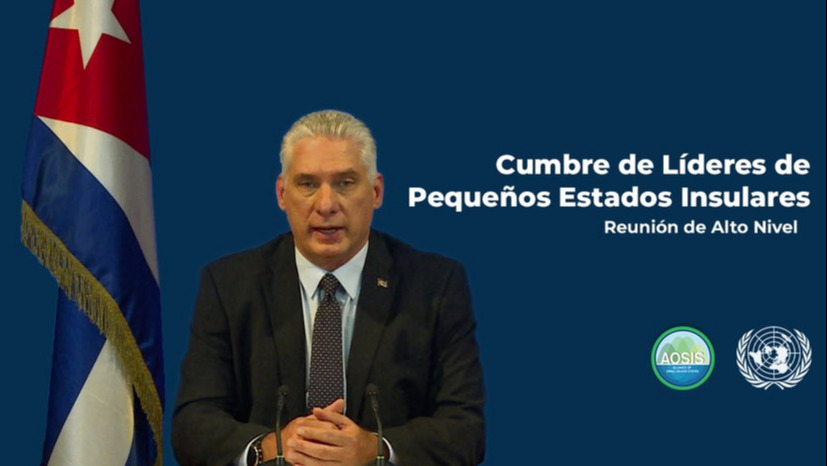
Photo: @PresidenciaCuba
By María Josefina Arce
Formed in 1990, the Alliance of Small Island States groups 44 nations, facing challenges such as those imposed by climate change and an unjust and unequal international economic order.
Cuba has contributed to that alliance its solidarity and commitment to work together, a will ratified by President Miguel Díaz Canel (in the photo) at the meeting of heads of state and government of that organization, held within the framework of the 76th session of the UN General Assembly, which is taking place in the U.S. city of New York.
Our country maintains a historic relationship with its Caribbean neighbors, which has materialized in a broad collaboration, mainly in health, education and projects to minimize the impact of meteorological phenomena, which due to global warming are becoming more frequent and more intense.
Thus, it has made available to other nations in the area the rapid response mechanisms of its Civil Defense system, described by international organizations as efficient and a model to follow.
Jamaica, Trinidad and Tobago, the British Virgin Islands, the Dominican Republic and Guyana are some of the countries that have benefited from this transfer of knowledge from Cuba through the Caribbean Risk Management Initiative, created in 2004 by the United Nations Development Program (UNDP).
Geographical distance, cultural and language differences have not prevented Cuba from cooperating with the Pacific island states.
Cuban medical brigades provide assistance in Kiribati, Vanuatu and Nauru, while more than 150 young people from that region have been trained in our universities, mainly in Medical Sciences.
The Caribbean country shares its experience and strategy to confront climate change, called Task Vida, which, through a series of actions, seeks to increase our resilience to extreme meteorological phenomena.
Today Cuba is a Dialogue Partner of the Pacific Islands Forum, the highest status to which extra-regional actors can aspire. This is a sign of confidence in our country and in its selfless and generous cooperation.
Havana has repeatedly spoken out in defense of the rights of developing countries, particularly small island states, which with a population of more than 60 million people are at risk of disappearing in the face of rising sea levels due to climate change.
These nations should not and cannot be ignored. The Cuban president denounced the irresponsible attitude of industrialized countries whose consumerist and selfish model puts other peoples at risk.
Despite the material limitations imposed by the U.S. blockade, Cuba reiterated its willingness to continue offering its solidarity contribution and sharing experiences, because as Díaz Canel emphasized, it is necessary to work together to have a future, a future in which the aspirations of our peoples can be fulfilled, without the threat of disappearing due to the excesses of others.

